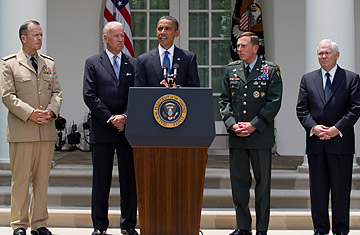
President Barack Obama speaks in the Rose Garden of the White House in Washington, Wednesday, June 23, 2010, to announce that Gen. David Petraeus, second from right, will replace Gen. Stanley McChrystal as the Commander in Afghanistan.
"McChrystal has few peers and makes even fewer mistakes," a former Delta Force commando wrote last year when his former boss was tapped to run the war in Afghanistan. But Gen. Stanley McChrystal didn't suffer military gasbags gladly, the retired major warned. He'd often dismiss officers in the middle of briefings that bored him. "He is always respectful, but it's never pretty."
The same could be said of President Obama's quick canning of McChrystal Wednesday, following one the general's few mistakes — allowing disparaging remarks by himself and his team about their civilian overseers to make it into print. While there was disappointment in some military circles over the outcome, there was little outrage. McChrystal had crossed a line, the consensus seemed to be, and the Commander-in-Chief was justified in deeming it a firing offense.
Still, military opinion split on whether Obama should have actually forced McChrystal out despite having grounds to do so. He is the second Afghan commander booted by Obama, and it's also the second time Obama has had to call McChrystal on the carpet — last year the President scolded his commander aboard Air Force One after McChrystal had publicly criticized the suggestion by Vice President Joe Biden that what was needed in Afghanistan were more drones and less troops. And military officers were quick to point out that Defense Secretary Robert Gates' push for accountability — he quickly fired Army officials responsible for poor conditions at Walter Reed Army hospital, and Air Force leaders for sloppy nuclear housekeeping — would be shredded if McChrystal were given another pass.
"The President was compelled to do what he did," says Douglas Macgregor, a retired Army colonel and military scholar. Not only did McChrystal demean his civilian colleagues and bosses, "he conveyed the impression that he doesn't have a great deal of confidence in the very approach that he had urged the President to take last year," Macgregor says. "Under those circumstances it would make good military sense to find someone else."
But retired Army general and military historian Robert Scales says he was discouraged by Obama's action. Such presidential punishments, he says, are generally reserved for policy clashes and more severe examples of disloyalty. "If you parse what happened here, the penalty versus the circumstances, I'm just not sure that it rose to that level," Scales says. "I'm just disappointed."
Military blogs were full of vitriol over McChrystal's comments, but were even more critical that they had appeared in a magazine many deem to be anti-military. "The President, despite what he claims, has just let Rolling Stone magazine change the course of the war and demote General David Petraeus because General McChrystal indirectly ridiculed his choices for civilian leadership to re-integrate the woman-killing, child-raping, Al Qaeda-loving, U.S. soldier-killing Taliban," read one typical post on Military.com. "An acknowledgement and an apology would have sufficed. Now Rolling Stone and Al Qaeda celebrate together today."
But much of the military's angst evaporated once General Dave Petraeus stepped forward to take over the Afghan billet. John Nagl, a retired Army lieutenant colonel who now runs the Center for a New American Security think tank, called Obama's selection of Petraeus a "masterstroke." It will, he says, allow for a seamless change of command. Petraeus "knows the players, reads the intelligence every day, and knows the strategy," Nagl says. The selection of his old colleague — the two were key authors of the Army's newly revamped counter-insurgency manual — stunned Nagl. "Technically, this is a step down for Petraeus," he concedes, from being responsible for U.S. security interests and deployments in the 22 nations stretching from Egypt to Pakistan that fall under Central Command, to running a war in just one of those countries. "But if I'd been less constrained by military bureaucracy," he adds, "I'd have recognized that this is the decisive time and Afghan is at the decisive point. And you put your best talent at the decisive point and time."
Not all serving and current officers supported the switch. "He was a leader among the children in the neighborhood, and a lot of times that manifested itself in leading him into trouble," Herbert McChrystal, a retired Army major general and father of the axed Afghanistan commander told TIME last year. Reached Wednesday at his Tennessee home Wednesday, McChrystal senior said he had nothing to say, several hours after Obama's announcement — at least, "not a thing to guys who write in magazines."
